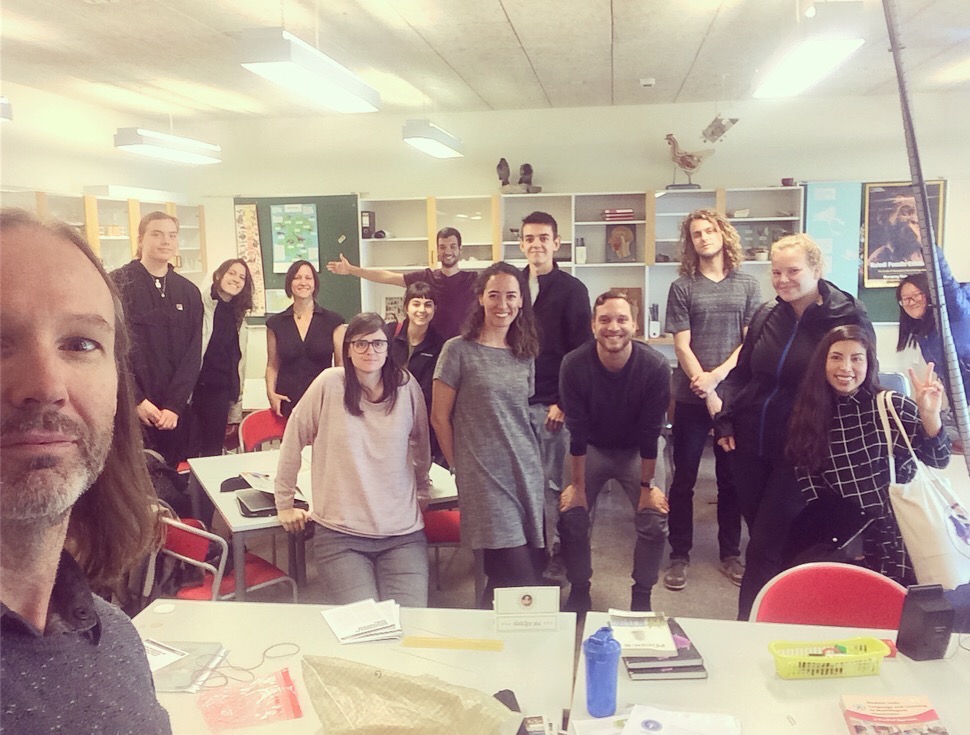Erasmus Staff Exchange 2018: University of Iceland, Reykjavik

Erasmus Staff Exchange 2018: University of Iceland, Reykjavik
Tülin Süral Dean & Cameron Dean
From the 10th to 14th September, we took part in an Erasmus Staff Exchange with the University of Iceland (Háskóli Íslands) in Reykjavik. We were guests in the Department of Education at the university and had the wonderful opportunity to teach classes and share our professional experiences with both colleagues and students.
Háskóli Íslands is a predominantly Icelandic language medium institution. As a result, they do not have a language preparation programme similar to Sabancı University, but they do have a number of courses taught in English (particularly in teacher training) and have systems of language support set up that are comparable to those at SU.
Teaching in a Multi-Cultural Classroom
The first class that we had the opportunity to teach focussed on teacher training methods for multicultural classrooms. The class was a mixture of future primary and secondary teachers from Iceland and other countries such as Finland, Peru, Spain, England and Germany and so was a good example of a multi-cultural class environment. The course co-ordinator, Adjunct Professor Charlotte Wolff, had asked us to focus on an aspect of curriculum design. With this in mind, we decided to present our Proj course as an example of an alternative and functional curriculum that could be used in a variety of contexts and for different ages. As it was a small group, the class was able to engage in meaningful discussion on how a PBL curriculum could be used in their future environments based on the example of our SL design.
English Language Use
This is one of the only courses offered at Háskóli Íslands specifically focussed on English and its use. Most of the students in this course are training to be teachers of primary and secondary school and the class was a mix of Icelandic, Peruvian and Philippine students. Among the foci of this course is critical thinking skills and developing academic skills with English medium texts, both for the students own studies and for their future teaching careers. We decided to present a lesson on critical reading skills, specifically on primary and secondary sources. This was also a small class and so facilitated a lot of discussion on how exactly to identify primary and secondary sources and on the importance of background information to academic texts in understanding the ideas presented and of their reliability. The students were challenged with the effect of comparing information from different sources and hopefully left with some ideas on how to more critically evaluate their own research texts and of those that they will be presenting to their own students in the future.
Foreign Language Teaching
The third class that we participated in was another course for prospective language teachers. We were invited to observe and contribute to the team discussions that occurred in the class. The focus was to introduce and brainstorm concepts of good language teaching and to begin to share experiences towards the development of clear pedagogical practices. The class was very multicultural, this time with a large contingent from Ghana. In many ways the class was similar to an introductory CELTA class and we were both able to share our experiences of being language teachers and of the Turkish education system and experiences of our language learners here at SL. Thanks to Professor Samuel Currey Lefever for this opportunity to contribute and experience.
Writing Centre
We had the opportunity to spend a morning observing the Writing Centre and discussing with the director of this programme, Randi Stebbins, the ways that they support the students in their academic writing. The centre was initially set up for Icelandic academic writing support and has in recent years expanded to involve programmes to focus on English academic writers, particularly at the PhD level. They have a well-developed system of peer-to-peer writing support similar to the programme developed at Sabancı University by Kristin Ann Şendur and they have found it a very successful and encouraging method of improving students writing ability and knowledge of writing expectations. It was very interesting to see their approach to writing and to hear of the similar struggles that they come across with their students.
As well as our teaching experience, we also enjoyed lunches with some of the staff from the department of Education and the Dean of the Department, Professor Ingólfur Ásgeir Jóhannesson. He described to us his own professional interests and specialisations such as teaching Gender Studies in the Classroom for teachers. The issue of gender is rarely taught as a focus for teachers in their professional practice and sounded like a fascinating approach to further developing modern teachers. Iceland is of course a world leader in human rights and gender equality and it was very encouraging to see these ideas reflected in the teaching programmes at the university.
Overall, this was an amazing experience. Not only is Iceland an incredible country to visit, with Reykjavik being a beautiful and accessible capital, but also the colleagues we met and the students we interacted with made it a fruitful and an unforgettable trip. We hope to be able to return and share more experiences in the future through this excellent exchange opportunity.
We would also like to thank Assistant Professor Brynja Elísabeth Halldórsdóttir for all of her assistance in setting up this exchange.
